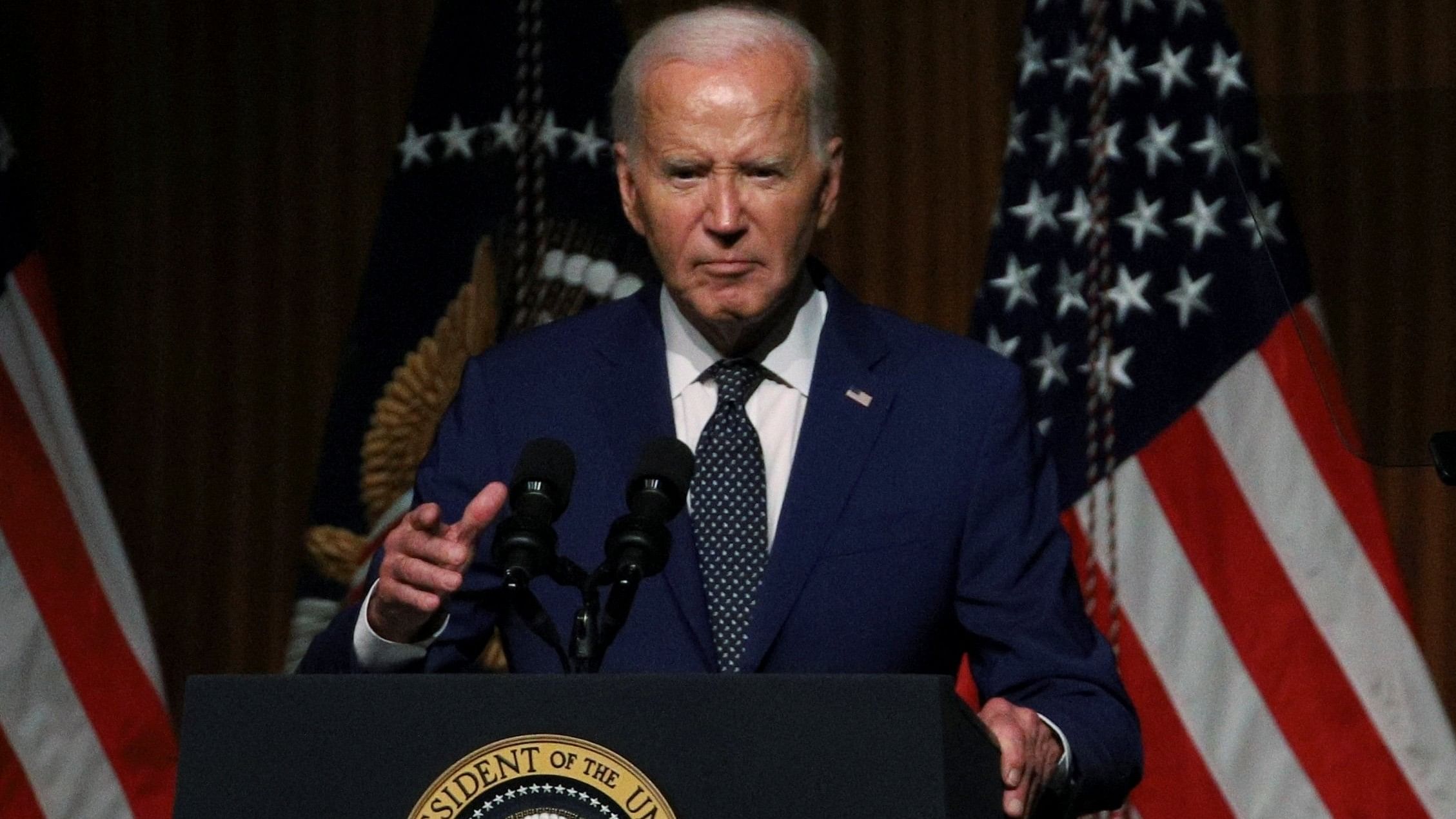
US President Joe Biden.
Credit: Reuters Photo
By Noah Feldman
When President Franklin Delano Roosevelt introduced his Supreme Court reform package in 1937, he had just won re-election with more than 60 per cent of the vote.
His party held supermajorities in both chambers of Congress. By contrast, President Joe Biden’s court reform plan comes at the nadir of his political power — as a lame-duck president forced to drop out of the race for reelection, with a one-vote majority in the Senate and a minority in the House.
When you consider that FDR’s reform plan failed despite his being the height of his popularity, that gives you a hint of what is likely to happen ultimately to Biden’s. There is no reality where Congress and the country would pass the constitutional amendments required to enact it. However, Roosevelt’s plan did have an impact. And Biden’s may as well.
Let’s start with Biden’s ideas. They are reasonable, so far as they go. His first proposal is for a constitutional amendment overruling Trump v. United States, the July Supreme Court decision that established extensive criminal immunity for a president’s official acts.
The decision is wrong and deserves to be repudiated by amendment. But that would take support from two-thirds of the House and Senate and three-quarters of the states — a level of consensus that’s impossible to imagine.
Biden’s second proposal is an 18-year term limit for Supreme Court justices, structured so that a new justice is appointed every two years. This isn’t crazy.
Although some great justices have served much longer — like Oliver Wendell Holmes, who was on the court from 1902 to 1932 — 18 years is more than enough for justices to make their mark and to provide continuity for the court and the legal system.
The regularity would take away some of the extreme arbitrariness of the current system, in which justices either die on the bench, retire because of infirmity, or choose the moment to step away based on which party is in power.
Yet the Constitution says that the justices serve “during good behavior.” The current Supreme Court would unquestionably understand that phrase to mean “unless impeached and removed”. In practice, that means the term limits also require a constitutional amendment, one that has about as much chance of being ratified as an amendment overturning the immunity ruling.
That leaves Biden’s final proposal. He argues for “a binding code of conduct for the Supreme Court” to replace its current voluntary code, which the court adopted less than a year ago. Many court critics believe that Congress could enact legislation that would make the code binding, and it’s (maybe) conceivable that the razor-thin Democratic majority might.
The trouble is that a plausible argument can be made that Congress lacks the constitutional authority to bind the Supreme Court, which is a coequal branch of government.
True, Congress blessed the code of judicial ethics that governs lower court judges. Yet there is arguably a difference between legislators making rules for lower court judges, who owe their existence to Congress, and making rules for the Supreme Court, which is created by the Constitution itself.
Regardless of which view is correct, it is the Supreme Court that would ultimately decide whether legislation imposing an ethics code is within Congress’s constitutional power. No extra points for guessing how the conservative majority would vote on that issue.
What is possible, although not probable, is that the public pressure created by the proposed ethics legislation might convince Chief Justice John Roberts of the value of the court creating an enforcement mechanism itself.
Justice Elena Kagan clearly thinks putting some teeth in the court’s voluntary code would be valuable. On July 25, after Biden’s plan had been teased, she said publicly at a judicial conference that some sort of enforcement mechanism was needed.
This is a warmer welcome than FDR got from the liberal justices when he proposed his court reform plan. Roosevelt, frustrated by the way the conservative-libertarian court opposed his legislative priorities, proposed adding a number of new justices to the bench — and conveniently, FDR would have been able to choose these justices himself.
Justice Louis Brandeis, arguably the greatest liberal justice of all time, opposed the plan, even though he also vociferously disagreed with the jurisprudence of the court’s conservative majority.
Brandeis thought the court-packing plan would undermine the Supreme Court as a legitimate institution. He joined the chief justice in refuting FDR’s argument that new justices were needed in a letter to the Senate Judiciary Committee.
Kagan’s comments are less oppositional. She was careful not to say how the enforcement mechanism for the ethics code would be adopted. But it is easy to infer that, while her comments are consistent with Biden’s proposal, they provide a way for the court to defang any proposed legislation by voluntarily adopting an enforcement mechanism — such as a committee of judges chosen by the chief justice.
If that’s right, Kagan is playing the constructive role of leveraging the proposed legislation to get the court to adopt its own enforcement mechanism.
It would take a majority of the justices to agree, but if Roberts does, it’s possible that he, the liberals, and at least one of the Trump-appointed justices would form an internal majority for further ethics reform.
Roosevelt’s court-packing plan is remembered as a failure that nevertheless helped push the conservative majority of the court to abandon its hard-line stance striking down New Deal legislation.
If Kagan can use Biden’s plan to do some good, maybe the Biden plan will be remembered as meaningful, too.